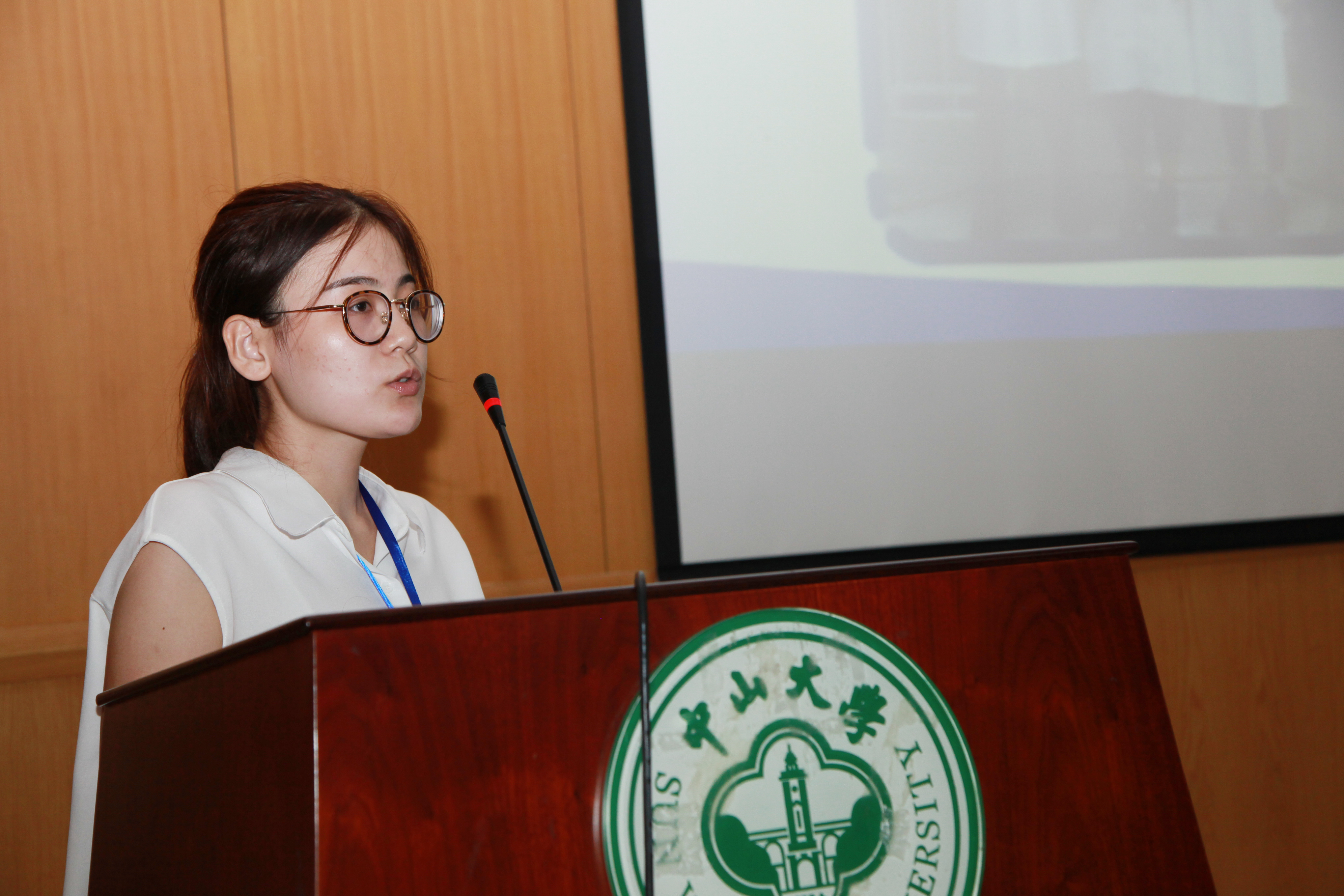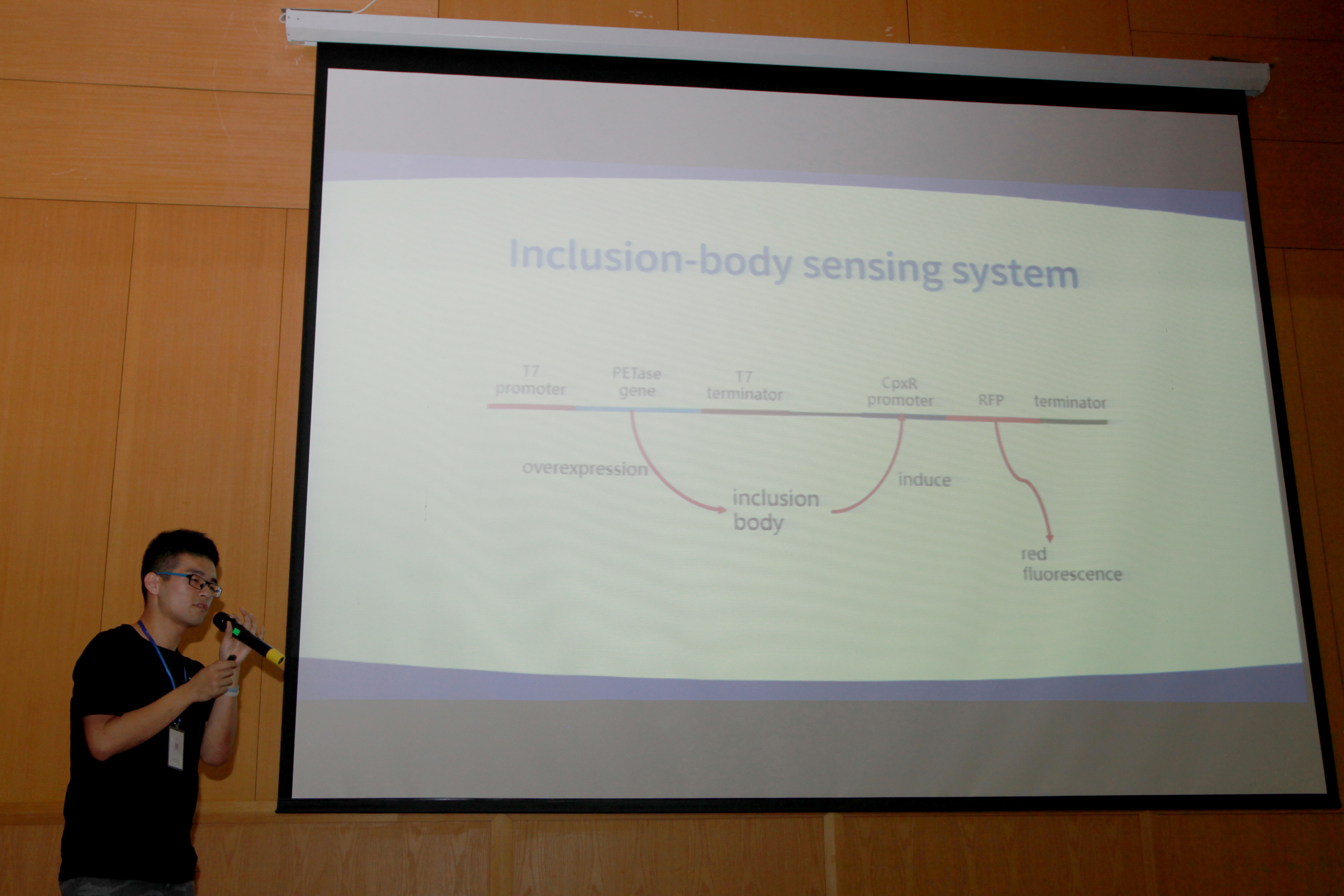| Line 296: | Line 296: | ||
<div class="testi-info"> | <div class="testi-info"> | ||
| − | <div class=" | + | <div class="col-md-12 about-left wow fadeInLeft animated" data-wow-delay=".5s" style="margin-top:20px;margin-bottom:20px;border:solid #3399FF 8px;padding:5px"> |
| − | + | <div class="col-md-4 about-left wow fadeInLeft animated" data-wow-delay=".5s"> | |
| − | <img src=" https://static.igem.org/mediawiki/2016/4/41/T--Tianjin--ccic.JPG " alt="" | + | |
| + | <img src="https://static.igem.org/mediawiki/2016/4/41/T--Tianjin--ccic.JPG" alt="" width="100%"> | ||
</div> | </div> | ||
| − | <div class=" | + | <div class="col-md-8 about-right wow fadeInRight animated" data-wow-delay=".5s"> |
| − | <p style="font-size: | + | <p class="data" style="color:#344525;font-size:18px">It was a great honor to be invited to SYSU-CCiC meeting organized by Sun Yat-Sen University (SYSU) to share iGEM experiences with other teams. CCiC(Central China iGEM Consortium) is a national iGEM seminar held by Chinese universities, aiming to promote the communication of Chinese iGEM teams and publicize the conception of synthesis biology.<br/> |
On the morning of September 2, 2016, we took a flight to Guangzhou from Tianjin. One hour later, we arrived at SYSU. Upon our registration, we exchanged ideas with some teams. At 7 pm, the opening ceremony began and each team made a brief introduction. In the following two days, we simulated the process of iGEM Giant Jamboree, presenting team projects and posters.<br/> | On the morning of September 2, 2016, we took a flight to Guangzhou from Tianjin. One hour later, we arrived at SYSU. Upon our registration, we exchanged ideas with some teams. At 7 pm, the opening ceremony began and each team made a brief introduction. In the following two days, we simulated the process of iGEM Giant Jamboree, presenting team projects and posters.<br/> | ||
At 5 pm of September 4,2016, the seminar was coming to a close. We took a photo together as a reminder. After dinner, we attended the closing ceremony. Afterwards, we went back to Tianjin and got occupied with our experiment again.<br/> | At 5 pm of September 4,2016, the seminar was coming to a close. We took a photo together as a reminder. After dinner, we attended the closing ceremony. Afterwards, we went back to Tianjin and got occupied with our experiment again.<br/> | ||
| − | We are so grateful to SYSU for invitation and treatment. During the seminar, we have made a lot of friends and had an understanding of other teams’ projects. In the meanwhile, we also got a number of beneficial suggestions. | + | We are so grateful to SYSU for invitation and treatment. During the seminar, we have made a lot of friends and had an understanding of other teams’ projects. In the meanwhile, we also got a number of beneficial suggestions. </p> |
| − | <p>P.S.<a href="https://static.igem.org/mediawiki/2016/a/a2/2016_SYSU-CCiC_%E6%89%8B%E5%86%8C.pdf">SYSU-CCiC Handbook</a> </a> </p> | + | <p>P.S.<a href="https://static.igem.org/mediawiki/2016/a/a2/2016_SYSU-CCiC_%E6%89%8B%E5%86%8C.pdf">SYSU-CCiC Handbook</a> </a></p> |
| − | + | </div> | |
| − | + | ||
| − | + | ||
</div> | </div> | ||
| + | |||
</div> | </div> | ||
Revision as of 02:42, 12 October 2016
<!DOCTYPE html>
OUR HP WITH TEAM NKU iGEM

On the day we visited professor Cunjiang Song, we conduct a human practice with team Nankai iGEM.
We visited team Nankai’s laboratory in Nankai university. They introduced to us about the general situation of them. We discussed with their members about project affairs about life in the laboratory. We took a photo together finally.
We are delighted to communicate with members of NKU iGEM. We hope that our rapport and friendship would last forever!
OUR HP With TEAM NJU iGEM
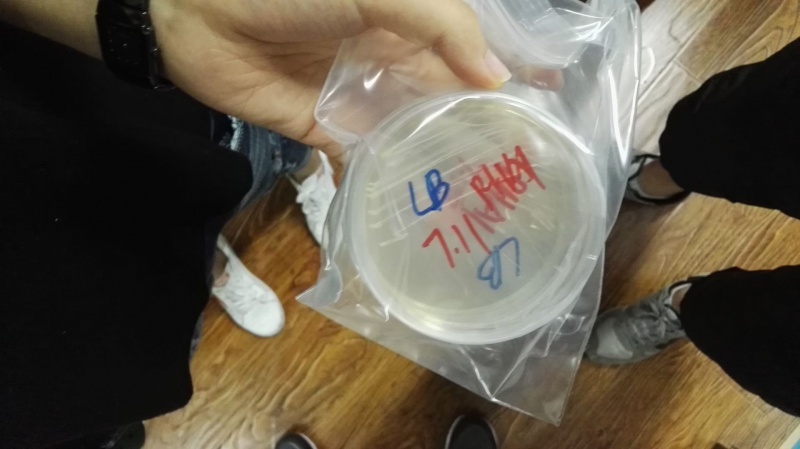
We found that Rhodococcus can degrade intermediate product TPA efficiently. Thus we got in touch with Prof. Aijun Liao with the help of iGEM NJU. He presented us the Rhodococcus jostii RHA1 which helps us a lot. We are grateful to what he has done.

Du:
Hi!
Xu:
Hi!
Du:
I’m Shuangshuang Du of team Nanjing_China from Nanjing University.
Xu:
I’m a member of iGEM_Tianjin. Our team would like to communicate with you.
Du:
Sure.
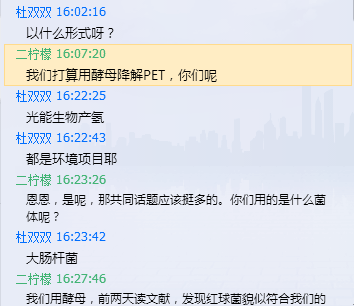
Du:
By what means?
Xu:
We intend to biodegrade PET using yeasts. How about your project?
Du:
Photobiological hydrogen production.
We both are environmental projects!
Xu:
Yes. Then we should have plenty of common topics. What strains do you use?
Du:
We use Escherichia coli.
Xu:
We use yeasts, but the other day when we consulted theses, we found that Rhodococcus might meet some of our needs.
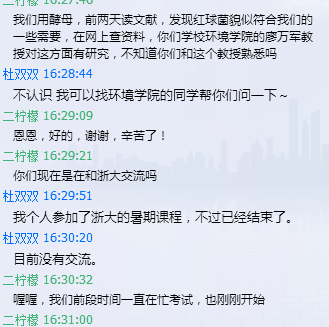
We use yeasts, but the other day when we consulted theses, we found that Rhodococcus might meet some of our needs. Searching through the internet, we learnt that Pro. Wanjun Liao from your university had deep researches in this area, so I wonder if you are familiar with him?
Du:
No. Though I’m not acquainted with him, I can ask my schoolmate in the School of Environment about him for you.
Xu:
Oh, yes. We’d really appreciate your help! By the way, do you have interflow with Zhejiang University at the moment?
Du:
I took part in its summer courses personally, and the courses have ended.
We don’t conduct any interflow with Zhejiang University currently.
Xu:
I see. We were engaged in our final exams some time ago and just began our project, too.

Du:
Hello!
The teacher replied and agreed.
Please send your address to me.
Xu:
Ha-ha!
Du:
So I think I’ll post it to you tomorrow by SF express.
Xu:
Lots of thanks! I’ll give you our address right now.

Du:
Hello!
The senior said she just inoculated two plates and she still needed them, so she was about to amplify the culture today and give it to me after plating. So I’ll post the plate to you. What do you think? The senior said she’d make it in 3 days.
Xu:
Oh, okay. Thanks for your effort!
Communication With PKU
Six representatives of Tianjin University iGEM 2016 Team arrived Peiking University on a rainy afternoon of 19th August and had a long lovely dicussion meeting with three other teams, Beijing Institute of Technology(Team BIT-China),University of Chinese Academy of Science(Team UCAS) and the ebullient host, Peiking University iGEM team.
On the very beginning of the meeting, each team leader gave a brief introduction on their projects. And team Tianjin's project attracted great interests in the environment problem of PET-degradation. After each team's presentation, we started to share our new ideas and problems we crossed with during the experiment, which was a very helpful and encouraging session where we help each other fix the experimental problems.
In a nutshell, this short trip to Beijing is a win-win collaboration.

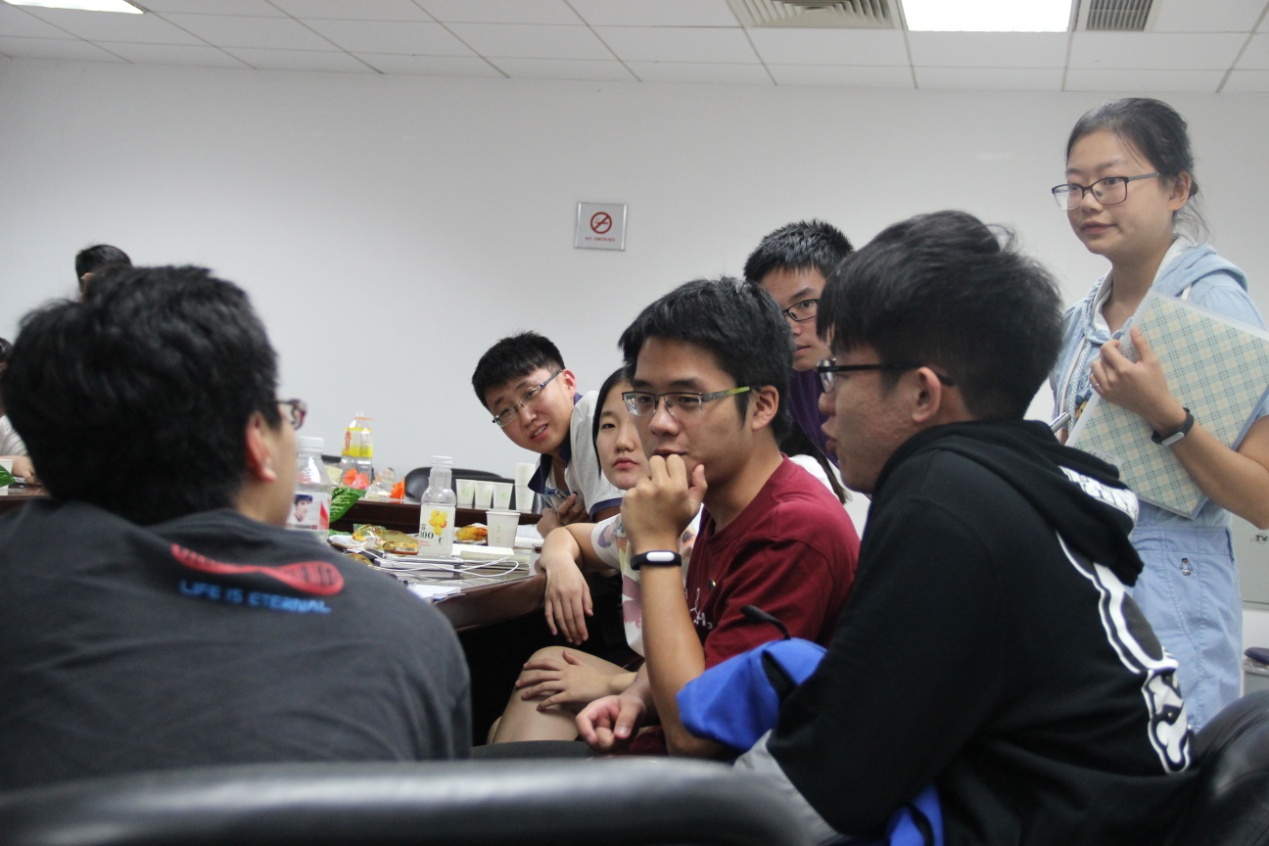
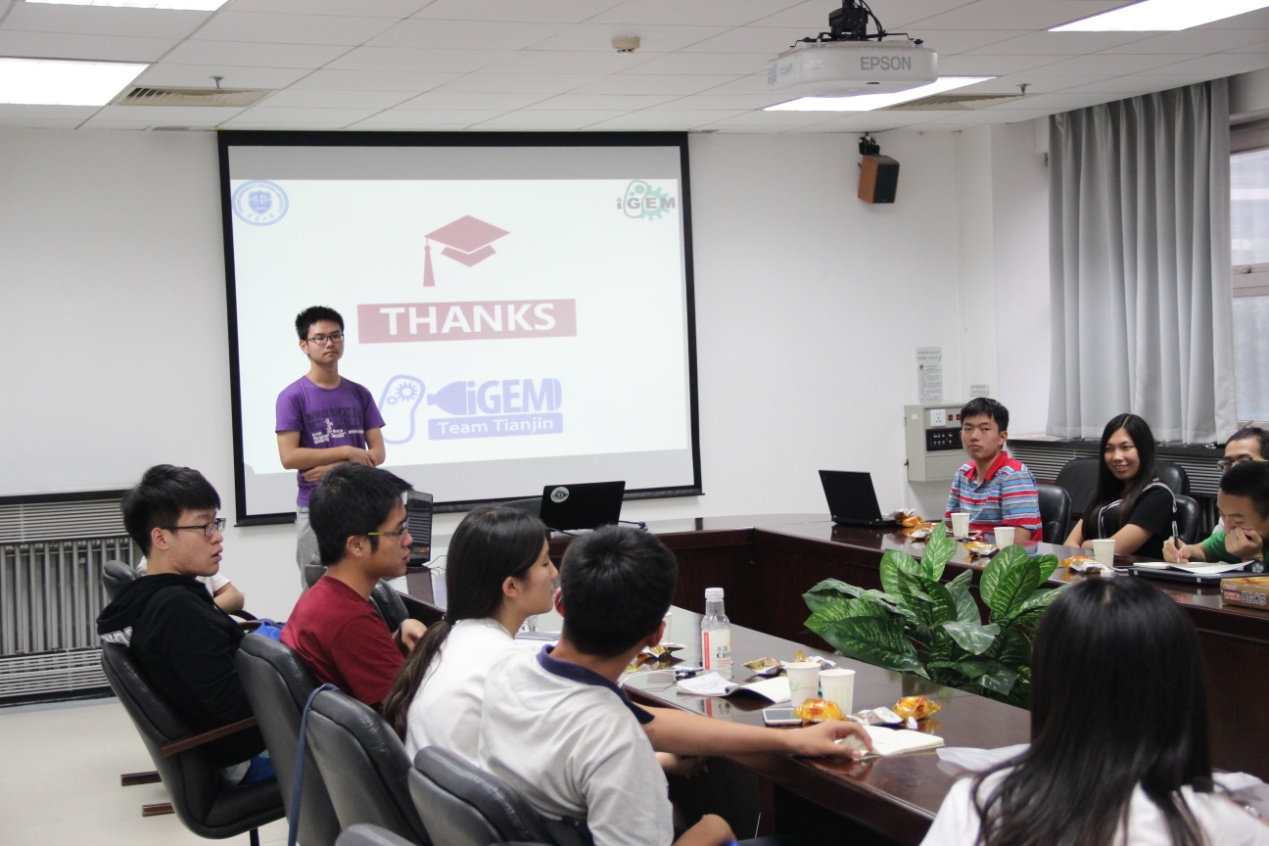
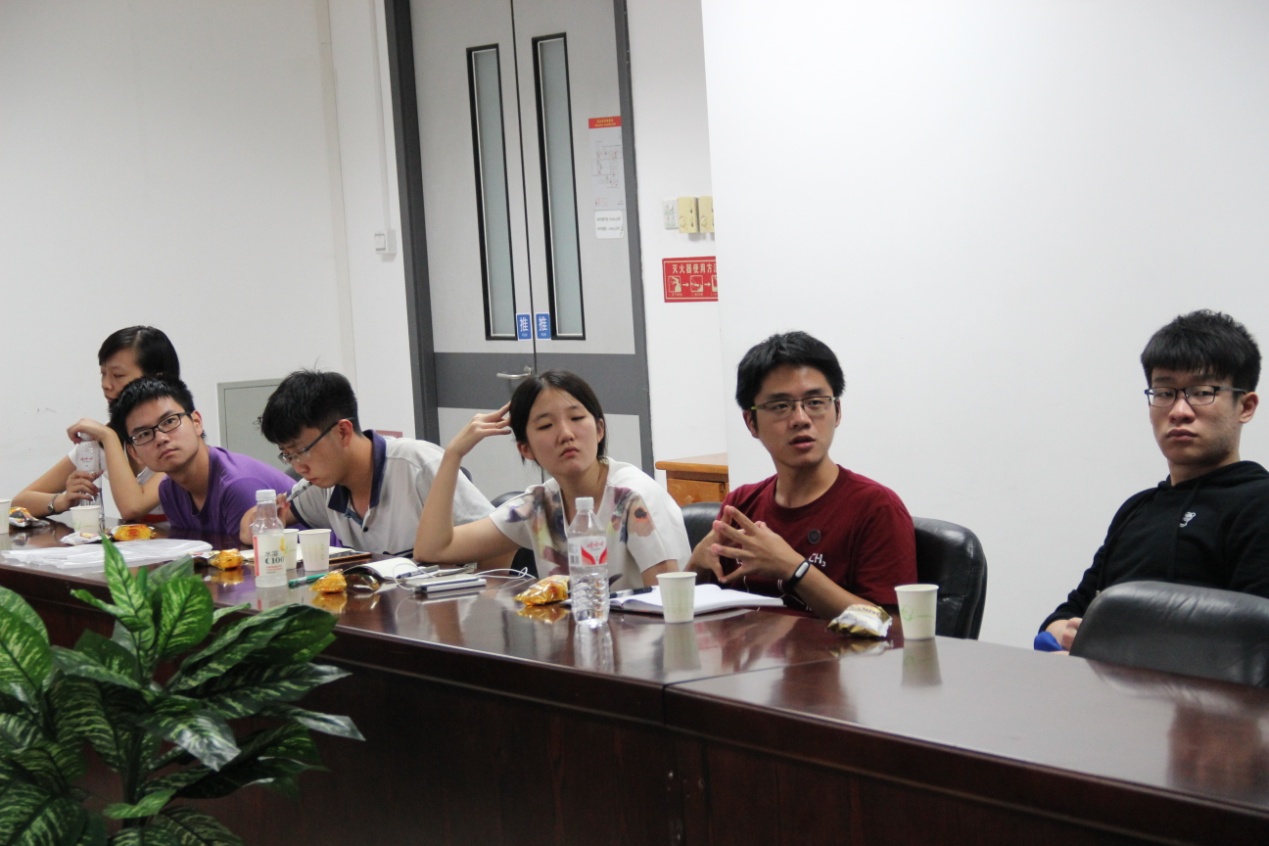
Human Practive for Questionnaire Collaboration
We team Tianjin contacted Team Pasteur, Team Pittsburgh, Team Valencia UPV, Team Virginia and Team NTU about the collaboration in July. Then we established and led a survey union with the support of them. We asked each team submit two or three questions about their own project and one question about synthetic biology or iGEM, and integrated the questions to the final version questionnaire.
Then, we posted it on twitter and facebook, many iGEMers participated in it and many iGEM teams reposted it on their homepage. We are very delighted to see their enthusiasm which encourages us a lot!

SYSU-CCiC MEETING

It was a great honor to be invited to SYSU-CCiC meeting organized by Sun Yat-Sen University (SYSU) to share iGEM experiences with other teams. CCiC(Central China iGEM Consortium) is a national iGEM seminar held by Chinese universities, aiming to promote the communication of Chinese iGEM teams and publicize the conception of synthesis biology.
On the morning of September 2, 2016, we took a flight to Guangzhou from Tianjin. One hour later, we arrived at SYSU. Upon our registration, we exchanged ideas with some teams. At 7 pm, the opening ceremony began and each team made a brief introduction. In the following two days, we simulated the process of iGEM Giant Jamboree, presenting team projects and posters.
At 5 pm of September 4,2016, the seminar was coming to a close. We took a photo together as a reminder. After dinner, we attended the closing ceremony. Afterwards, we went back to Tianjin and got occupied with our experiment again.
We are so grateful to SYSU for invitation and treatment. During the seminar, we have made a lot of friends and had an understanding of other teams’ projects. In the meanwhile, we also got a number of beneficial suggestions.

